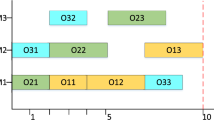Abstract
Flexible job shop scheduling in uncertain environments plays an important part in real-world manufacturing systems. With the aim of capturing the uncertain and multi-objective nature of flexible job shop scheduling, a mathematical model for the multi-objective stochastic flexible job shop scheduling problem (MOSFJSSP) is constructed, where three objectives of make-span, maximal machine workload, and robustness to uncertainties are considered simultaneously under a variety of practical constraints. Two new scenario-based robustness measures are defined based on statistical tools. To solve MOSFJSSP appropriately, a modified multi-objective evolutionary algorithm based on decomposition (m-MOEA/D) is developed for robust scheduling. The novelty of our approach is that it adopts a new subproblem update method which exploits the global information, allows the elitists kept in an archive to participate in the child generation, employs a subproblem selection and suspension strategy to focus more computational efforts on promising subproblems, and incorporates problem-specific genetic operators for variation. Extensive experimental results on 18 problem instances, including 8 total flexible and 10 partial flexible instances, show that the two new robustness measures are more effective than the existing scenario-based measures, in improving the schedule robustness to uncertainties and maintaining a small variance of disrupted objective values. Compared to the state-of-the-art multi-objective optimization evolutionary algorithms (MOEAs), our proposed m-MOEA/D-based robust scheduling approach achieves a much better convergence performance. Different trade-offs among the three objectives are also analyzed.




Similar content being viewed by others
Notes
\(|{*}|\) denotes the size of the set \({*}\), and \(\lceil \cdot \rceil \) means the minimum integer value equal to or bigger than \(\cdot \).
In our m-MOEA/D, when calculating the \(g^{te}\)function defined in (13), the normalized function value \(fno_j \) is used instead of \(f_j \).
References
Abbass HA, Bender A, Dam HH, Baker S, Whitacre J, Sarker R (2008) Computational scenario-based capability planning. In: Proceedings of the 10th annual conference on genetic and evolutionary computation. New York, NY, USA, pp 1437–1444
Adibi MA, Zandieh M, Amiri M (2010) Multi-objective scheduling of dynamic job shop using variable neighborhood search. Expert Syst Appl 37(1):282–287
Al-Fawzan MA, Haouari M (2005) A bi-objective model for robust resource-constrained project scheduling. Int J Prod Econ 96:175–187
Al-Hinai N, ElMekkawy TY (2011) Robust and stable flexible job shop scheduling with random machine breakdowns using a hybrid genetic algorithm. Int J Prod Econ 132(2):279–291
Al-Hinai N, ElMekkawy TY (2012) Solving the flexible job shop scheduling problem with uniform processing time uncertainty. World Acad Sci Eng Technol 64:996–1001
Alhind A, Zhang Q (2014) MOEA/D with Tabu Search for multiobjective permutation flow shop scheduling problems. IEEE congress on evolutionary computation (CEC 2014). IEEE Press, Beijing, pp 1155–1164
Brandimarte P (1993) Routing and scheduling in a flexible job shop by tabu search. Ann Oper Res 41:157–183
Carvalho R, Saldanha R, Gomes B, Lisboa A, Martins A (2012) A multi-objective evolutionary algorithm based on decomposition for optimal design of Yagi-Uda antennas. IEEE Trans Magn 48(2):803–806
Chaariabc T, Chaabaneab S, Loukild T, Trentesaux D (2011) A genetic algorithm for robust hybrid flow shop scheduling. Int J Comput Integr Manuf 24(9):821–833
Chang P, Chen S, Zhang Q, Lin J (2008) MOEA/D for flowshop scheduling problems. IEEE congress on evolutionary computation (CEC 2008). IEEE Press, HongKong, pp 1433–1438
Choi SH, Wang K (2012) Flexible flow shop scheduling with stochastic processing times: a decomposition-based approach. Comput Ind Eng 63:362–373
de Vonder SV, Demeulemeester E, Herroelen W (2008) Proactive heuristic procedures for robust project scheduling: an experimental analysis. Eur J Oper Res 189(3):723–733
Deb K (2001) Multi-objective optimization using evolutionary algorithms. Wiley, New York
Deb K, Pratap A, Agarwal S, Meyarivan TA (2002) Fast and elitist multiobjective genetic algorithm: NSGA-II. IEEE Trans Evol Comput 6(2):182–197
Demir Y, Kürşat İşleyen S (2013) Evaluation of mathematical models for flexible job-shop scheduling problems. Appl Math Modell 37:977–988
Fattahi P, Fallahi A (2010) Dynamic scheduling in flexible job shop systems by considering simultaneously efficiency and stability. CIRP J Manuf Sci Technol 2(2):114–123
Gao KZ, Suganthan PN, Tasgetiren MF, Pan QK, Sun QQ (2015) Effective ensembles of heuristics for scheduling flexible job shop problem with new job insertion. Comput Ind Eng 90:107–117
Ghosh S (1996) Guaranteeing fault tolerance through scheduling in real-time systems. Ph.D. thesis. University of Pittsburgh
Ghosh S, Melhem R, Mosse D (1995) Enhancing real-time schedules to tolerate transient faults. In: IEEE real-time systems symposium. IEEE Press, pp 120–129
Goren S, Sabuncuoglu I, Koc U (2012) Optimization of schedule stability and efficiency under processing time variability and random machine breakdowns in a job shop environment. Naval Res Logist 59(1):26–38
Jamili A (2016) Robust job shop scheduling problem: mathematical models, exact and heuristic algorithms. Expert Syst Appl 55:341–350
Jensen MT (2003) Generating robust and flexible job shop schedules using genetic algorithms. IEEE Trans Evol Comput 7(3):275–288
Jourdan L, Talbi E (2007) Combinatorial optimization of stochastic multi-objective problems: an application to the flow-shop scheduling problem. In: Evolutionary multi-criterion optimization, Lecture Notes in Computer Science, vol 4403. Matsushima, Japan, pp 457–471
Kacem I, Hammadi S, Borne P (2002a) Approach by localization and multi-objective evolutionary optimization for flexible job shop scheduling problems. IEEE Trans Syst Man Cybern Part C Appl Rev 32(1):1–13
Kacem I, Hammadi S, Borne P (2002b) Pareto-optimality approach for flexible job-shop scheduling problems: hybridization of evolutionary algorithms and fuzzy logic. Math Comput Simul 60:245–276
Laslo Z, Golenko-Ginzburg D, Keren B (2008) Optimal booking of machines in a virtual job-shop with stochastic processing times to minimize total machine rental and job tardiness costs. Int J Prod Econ 111:812–821
Leon VJ, Wu SD, Storer RH (1994) Robustness measures and robust scheduling for job shops. IIE Trans 26(5):32–41
Li H, Zhang Q (2009) Multiobjective optimization problems with complicated Pareto sets, MOEA/D and NSGA-II. IEEE Trans Evol Comput 13(2):284–302
Liu L, Gu H, Xi Y (2007) Robust and stable scheduling of a single machine with random machine breakdowns. Int J Adv Manuf Technol 31:645–654
Mashwani W, Salhi A (2014) Multiobjective memetic algorithm based on decomposition. Appl Soft Comput 21:221–243
Mehta SV, Uzsoy RM (1999) Predictable scheduling of a single machine subject to breakdowns. Int J Comput Integr Manuf 12:15–38
Mokhtari H, Dadgar M (2015) Scheduling optimization of a stochastic flexible job-shop system with time-varying machine failure rate. Comput Oper Res 61:31–45
O’Donovan R, Uzsoy RM, McKay KN (1999) Predictable scheduling of a single machine with breakdowns and sensitive jobs. Int J Prod Res 37:4217–4233
Qi Y, Hou Z, Li H, Huang J, Li X (2015) A decomposition based memetic algorithm for multi-objective vehicle routing problem with time windows. Comput Oper Res 62:61–77
Rahmani D, Heydari M (2013) Robust and stable flow shop scheduling with unexpected arrivals of new jobs and uncertain processing times. J Manuf Syst 33(1):82–94
Schott JR (1995) Fault tolerant design using single and multicriteria genetic algorithm optimization. Master’s thesis, Department of Aeronautics and Astronautics, Massachusetts Institute of Technology, Cambridge, Massachusetts
Shen X, Yao X (2015) Mathematical modeling and multi-objective evolutionary algorithms applied to dynamic flexible job shop scheduling problems. Inf Sci 298:198–224
Ullah S, LIU Q, Zhang C, Awan YR (2009) Scheduling with uncertain processing times: applying \(\beta \)-robust schedule on two-machine flow-shop with constraints. In: IEEE International conference on industrial engineering and engineering management (IEEM 2009). IEEE Press, Hong Kong, pp 1946–1950
Van Veldhuizen DA, Lamont GB (1999) Multiobjective evolutionary algorithm test suites. In: Proceedings of 1999 ACM symposium on applied computing. ACM Press, pp 351–357
Xiong J, Liu J, Chen Y, Abbass HA (2011) An evolutionary multi-objective scenario-based approach for stochastic resource investment project scheduling. In: 2011 IEEE Congress on Evolutionary Computation (CEC 2011). IEEE Press, New Orleans, LA, USA, pp 2767–2774
Xiong J, Xing L, Chen Y (2013) Robust scheduling for multi-objective flexible job-shop problems with random machine breakdowns. Int J Prod Econ 141:112–126
Zitzler E, Thiele L (1999) Multiobjective evolutionary algorithms: a comparative case study and the strength Pareto approach. IEEE Trans Evol Comput 3(4):257–271
Zitzler E, Künzli S (2004) Indicator-based selection in multiobjective search. In: ParallelProblem solving from nature (PPSN VIII). Lecture Notes in ComputerScience 3242, Springer, Birmingham, pp 832–842
Zhang Q, Li H (2007) MOEA/D: a multiobjective evolutionary algorithm based on decomposition. IEEE Trans Evol Comput 11(6):712–731
Zhang Q, Liu W, Li H (2009) The performance of a new version of MOEA/D on CEC09 unconstrained MOP test instances. In: Proceedings of IEEE congress on evolutionary computation. IEEE Press, Trondheim, pp 203–208
Zhang G, Zhu H, Zhang C (2011) Hybrid intelligent algorithm for flexible job-shop scheduling problem under uncertainty. In: Advances in reinforcement learning, InTechOpen, pp 361–370, ISBN: 978-953-307-369-9
Zuo X, Mo H, Wu J (2009) A robust scheduling method based on a multi-objective immune algorithm. Inf Sci 179:3359–3369
Acknowledgments
This work is supported by the National Natural Science Foundation of China (NSFC) under Grant Nos. 61502239 and 61503191, Natural Science Foundation of Jiangsu Province of China under Grant Nos. BK20150924 and BK20150933, and Qing Lan Project of Jiangsu Province of China.
Author information
Authors and Affiliations
Corresponding author
Ethics declarations
Conflict of interest
Disclosure of potential conflicts of interest.
Humans and animal rights
Research involving human participants and/or animals.
Additional information
Communicated by V. Loia.
Rights and permissions
About this article
Cite this article
Shen, XN., Han, Y. & Fu, JZ. Robustness measures and robust scheduling for multi-objective stochastic flexible job shop scheduling problems. Soft Comput 21, 6531–6554 (2017). https://doi.org/10.1007/s00500-016-2245-4
Published:
Issue Date:
DOI: https://doi.org/10.1007/s00500-016-2245-4




